Minutes after Ronald Reagan took the oath of office, on January 20, 1981, Iran released the 52 American hostages it had held for 444 days.
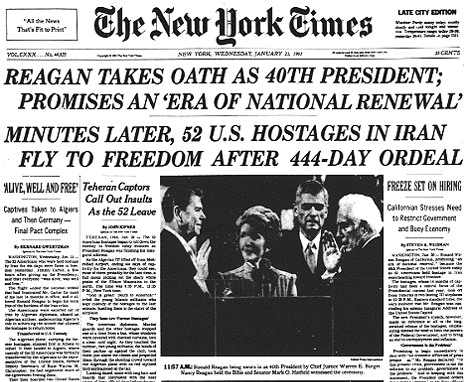
Why did Iran hold American hostages for more than a year, then suddenly release them on the first day of Reagan’s presidency? Simple: Iran judged Reagan’s one-term predecessor, Jimmy Carter, as weak — and knew that The Gipper would bomb them into oblivion.
Tyrants pounce on weakness and run from strength.
Juxtapose the powerful New York Times image above with its polar-opposite, which Iran’s Supreme Leader Ayatollah Ali Khamenei tweeted on July 25, 2015, suggesting that Barack Obama would be committing suicide by challenging the terrorist country with which he had just “negotiated” a weak nuclear-arms agreement. Reagan must be rolling in his grave.
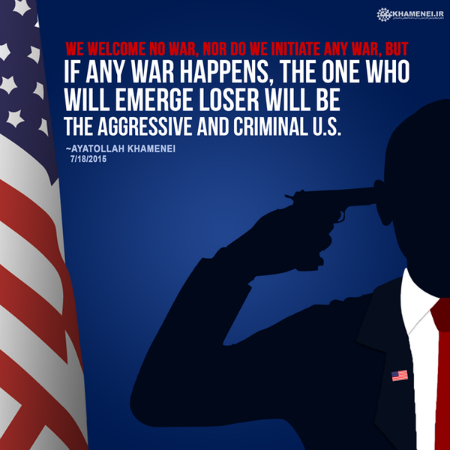
Why Is The Donald So Popular?
Along comes The Donald, AKA Donald Trump. On June 16, 2015, at his lavish Trump Tower in New York City, Trump announced his presidential candidacy with words that inflamed some and elated others, and offered a strong call to action: Make America Great Again.
From that moment until today, the pundits, on both sides of the aisle, have dismissed him. Even the darling of conservatives, Dr. Charles Krauthammer, called Trump a “rodeo clown,” despite his ever-rising popularity.
May I remind you that the Republican establishment trashed Reagan, too. They called him extremist, unelectable, an ultra-rightwing nut, dumb, ignorant, and not “one of them.” The American people begged to differ. So does history.
What’s going on here? Why is The Donald so popular?
Donald Trump wants to make America great again. His admonition suggests that America isn’t great anymore. He’s right:
- Gallup: more US companies are dying than being born
- Foodstamp beneficiaries have exceeded 46M for 38 straight months
- The labor-force-participation rate is 62.6%, the lowest since 1977
- 30.3% of Millennials still are living with their parents
- ETS: American Millennials are among the world’s least-skilled employees
- Census Bureau: Home ownership lowest since 1967
So what? The Donald is just a rich, greedy businessman. He doesn’t know how government works and can’t fix these problems. That’s what his detractors say, right?
Newsflash: the so-called polite, politically correct politicians, who do know government, got us into this mess. They made empty promises and delivered higher taxes, more regulation, less liberty, and embarrassing defeats around the world. Every time there’s a problem, the typical pol races to make a speech or sponsor, you guessed it, new legislation.
Rudov Compares Trump & Jeb on Newsmax TV: 06.17.15
Trump has had some big failures, like his shuttered properties in Atlantic City. But, he can point to his thriving hotels, golf courses, and winery as examples of achievement. Voters will compare his successful, tangible, job-creating companies, on one hand, to 1000-page laws that make America uncompetitive and nobody reads (even the politicians) on the other.
They Want a Fearless President
People know America is declining; they see it and live it. They’re sick of losing and want to win. They want a fearless president who has the courage of his convictions, who stands up to terrorists — not one who draws a “red line” in the sand with Syria and then backs down; not one who gets booed for saying all lives matter, then cowardly atones to the rabble.
Wimpiness dominates in the corporate world, too. In April, Clorox created a bleach bottle from emojis. The infantilized rabble complained that, on a day that Apple released brown-skinned emojis, Clorox had no right to be white. Seriously. Instead of telling these children to piss off, Clorox caved and apologized for “offending” them.
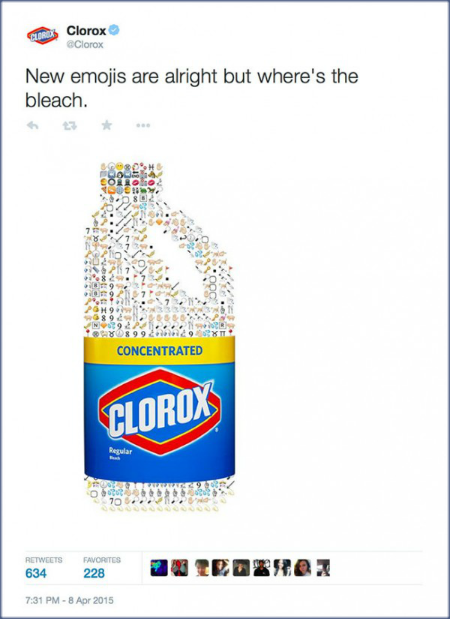
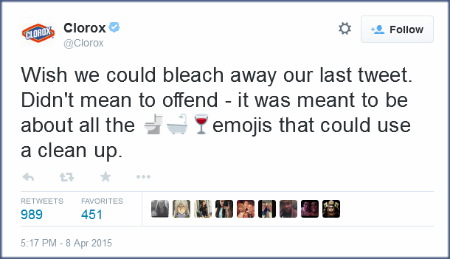
In June, Janet Napolitano, president of the University of California, announced a ban on a fascicle of words and phrases, including articulate, meritocracy, land of opportunity, melting pot, human race, and the most qualified should get the job. Academic tyranny.
Did you ever think speech could or would be banned in America?
Why not? Big Government has invaded all aspects of our lives: food, cars, neighborhoods, lightbulbs, healthcare, and religious beliefs, to name a few. Because of this tyranny, which voters elected, most people no longer voice their objections.
Donald Trump, by proxy, personifies, represents, and articulates the concerns and rage of many Americans — sans regrets — and they love him for it. He’s suffered financially, as NBC, ESPN, and Macy’s have fled (for now) his orbit, with lightning speed. Still, he did not flinch. Compare him to Clorox’s CEO.
Following Branding Principles and Surging
On July 26, 2015, CNN announced the results of a new poll showing The Donald, a nickname his ex-wife Ivana gave him, leading all Republicans. This wasn’t supposed to happen: he’s insulted Democrats, almost all his rivals, and many in the media. But, it is happening.
This is the art of The Donald: taking the slings and arrows, fighting back, being written off, drawing big crowds, following branding principles — and surging.
What are those branding principles? As I’ve stated ad nauseam, when you have a strong brand, people react to, remember, and repeat your message. Who’s getting quoted more and pilloried more than Trump and rising in the polls?
Donald Trump gets the pulse of Americans because he deals with them in business — in person. When people buy your products, they tell you their problems, fears, and wishes.
Conversely, politicians condescend to voters and pander to special-interest groups, donors, and lobbyists — their carefully crafted, focus-group-tested, teleprompter-displayed rhetoric proves it. That’s why their brands stink, and industrious taxpayers are outraged.
Trump now must parlay his current lead into a permanent one by convincing voters that he can and will offer more than controversy and headlines. If America is to become great again, it needs tangible, workable solutions, and fast, and a leader who can execute them.
Finally, The Donald must convince Democrats he can be their leader, too, with his current brand. If, in the coming months, he becomes a pandering, backpedaling, cautious politician, to win the liberal vote, he will kill his brand — and his candidacy.
Parting Advice to CEOs
Take a page from Trump’s book, even if you don’t like or agree with him: When the rabble protests, push back and hold fast to your beliefs and principles.
If the rabble makes you flinch, they will forever control you and your brand.
Always control your brand — and keep it sharp.
Trump Describes His Strategy to WSJ
POSTSCRIPT #1: Trump Is Crushing Rivals in New Hampshire (07.28.15)
POSTSCRIPT #2: Mark Cuban Praises The Donald
POSTSCRIPT #3: Trump Soars Past Jeb, Rubio in Florida (07.29.15)
POSTSCRIPT #4: Iran Publishes Book on Fooling USA & Destroying Israel
POSTSCRIPT #5: WSJ/NBC Poll: Trump Leading Walker, Bush (08.02.15)
POSTSCRIPT #6: Fox News Puts Trump at #1 in First GOP Debate (08.04.15)
POSTSCRIPT #7: Jeb Bush Called Donald Trump “Buffoon, Clown, Asshole”
POSTSCRIPT #8: Megyn Kelly Says Fox News Has Secret Plan to Keep Trump in Line
POSTSCRIPT #9: Bloomberg: Fox News Attacks on Trump Strengthened Him
POSTSCRIPT #10: Carl Icahn Wants to Be Trump’s Treasury Secretary
POSTSCRIPT #11: Is Donald Trump Turning Black Women into Republicans?
POSTSCRIPT #12: Trump Surges in Polls and Makes Nice With Ailes After Debate
POSTSCRIPT #13: Mark Halperin: Other Campaigns Now Think Trump Can Win
POSTSCRIPT #14: CNN Poll: Trump Close to Surpassing Hillary (08.19.15)
POSTSCRIPT #15: Trump Dumbfounds Pollsters (08.27.15)
POSTSCRIPT #16: AIM: The Secret of Trump’s Success
POSTSCRIPT #17: Monmouth University: Trump’s National Support Hits 30% (09.03.15)
POSTSCRIPT #18: Carl Icahn to Endorse Donald Trump’s Presidential Bid (09.28.15)
POSTSCRIPT #19: Chris Wallace & Establishment Republicans Now Think Trump Can Win
POSTSCRIPT #20: GOP Concedes Trump’s Inevitability: Branding Beats Punditry
POSTSCRIPT #21: Trump Deflating His Brand with Weird Personal Attacks
POSTSCRIPT #22: How Trump Worked His Way Through Massive 1990s Debt
© 2015 Marc H. Rudov. All Rights Reserved.
About the Author
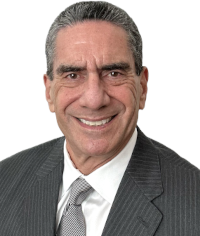
Marc Rudov is a branding advisor to CEOs,
producer of MarcRudovTV, and author of four books

